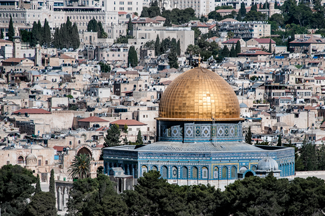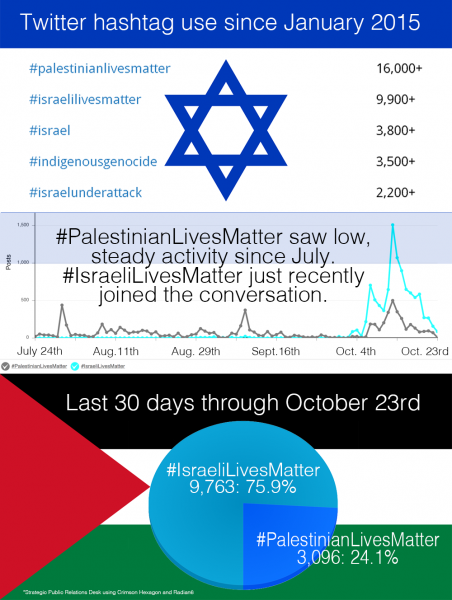Violence in Israel Divides Social Media
The conflict between Israel and Palestine cannot be summarized in 140 characters, but many on social media networks still try. In many ways, the proliferation of information via social media provides a more diverse marketplace of ideas than limited news media and propaganda. On the other hand, this same ease of proliferation allows unverified and even blatantly false information to run rampant and bias readers to one side or another.
In recent weeks, a series of attacks on Israelis and Palestinians alike has sparked new controversy in the region, and while violence has been commonplace in the past, these attacks “represent an escalation,” said Paul Larudee, Treasurer and Co-Founder of the California-based Free Palestine Movement, in a conversation with Annenberg Media.
The case of Ahmad Manasra, a 13-year-old Palestinian boy who allegedly attacked several Israelis with a knife before being subdued, caused a firestorm of social media backlash. Contradictory reports circulated online, some erroneously claiming Manasra was killed, calling him an innocent victim of police brutality, while others called him a terrorist.
Prime Minister Benjamin Netanyahu addressed the situation in a press conference, calling out President Mahmoud Abbas of the Palestinian National Authority for promoting that false narrative. “It’s time that President Abbas stop inciting, justifying… murder,” said Netanyahu.

“That’s nonsense,” said Larudee. “The biggest incitement that’s happening is on the Israeli side, they’re pushing these people to resist and fight back.”
Larudee argues that the restrictions placed on Palestinians living in Jerusalem put “tremendous, tremendous pressure on the society. You half expect it to explode, and if it doesn’t explode, the policy of the current administration in Israel is to make it explode so that they have a pretext for drastic action, such as the killing and wounding of more than 1300 people, Palestinians, in the last month or so.”
The controversy has given rise to rival Twitter hashtags: #IsraeliLivesMatter and #PalestinianLivesMatter. The social media conversation appears split into the two camps, with tempers and rhetoric flaring on either side, pointing fingers this way and that.
“I have both Israeli and Palestinian friends,” said Aaron Rifkind, President of the Israel Leadership Council at USC in a phone interview. “So depending on their viewpoints they’ll either promote, you know, Israel is inciting violence, or my Jewish or Israeli friends will be saying the Palestinians are inciting the violence.”
Violence is not uncommon in the area.
“This situation is pretty consistent, there is some kind of attack like this… usually about once a week here, by Palestinians upon Jews,” said Renee Sharon, an American expatriate working in Jerusalem, in a telephone interview. “But now all of a sudden when something gets big and becomes a movement, all of the media comes … it’s really difficult to believe that these media sources are trying to accurately cover the news.”
Sharon disagrees with Larudee’s accusations.
“I won’t tell you that the Palestinians living in these places are living wonderful lives. I know it’s very difficult there, but it’s not Israel’s fault,” she said. “It’s their (Palestine’s) leadership’s fault, and if their leadership wasn’t encouraging people to come and do terrorist attacks every day, there wouldn’t be a need for increased security. There would be ways opened for peace. But that’s not what’s happening. Their leadership doesn’t want peace. Their leadership wants the annihilation of the Jewish people and the destruction of Israel.”
Nine Israelis have been killed since the beginning of October, as well as 48 Palestinians, half of whom were alleged attackers, according to the Sydney Morning Herald. But these numbers are subject to scrutiny, as more than one Israeli Jew has been killed after being mistaken for a Palestinian attacker by Israeli soldiers, according to Al Jazeera.
It is perhaps an oversimplification to compare the Israel-Palestine situation to the Black Lives Matter movement, but that hasn’t stopped #PalestinianLivesMatter activists from expressing solidarity via social media.

Larudee, for one, sees a strong correlation in the inherent racism of the two conflicts.
“The only reason that Palestinians are treated this way is because they’re not Jews. If they were Jews they would be welcomed with open arms.” He compares the violence and discrimination suffered by African-Americans to the plight of Palestinians, saying “The brutality that’s used on behalf of the ruling classes is another parallel.”
Rifkind, on the other hand, doesn’t think there is a comparison. “I think they are two very separate issues that shouldn’t be conflated. But then again I think all lives matter… I don’t think we should be taking sides.”
He argues that the social media conversation polarizes the issue even further.
“Social media is just an extension of the news media in terms of either sensationalizing something or taking one side or the other and making it hard to find the middle ground on these issues.”
However, whether he meant to or not, Rifkind’s statement that “all lives matter” is an inherent comparison to the controversy surrounding the Black Lives Matter movement. The hashtag #AllLivesMatter began as a response to #BlackLivesMatter, in what President Barack Obama characterized as a misinterpretation of the meaning behind #BlackLivesMatter.
“I think the that reason that the organizers used the phrase "black lives matter" was not because they were suggesting nobody else's life matters,” said Obama at a Criminal Justice Reform Panel, according to Vox. “Rather, what they were suggesting was there is a specific problem that is happening in the African-American community that's not happening in other communities. And that is a legitimate issue that we've got to address.”
When Palestinians and Israelis appropriate these hashtags, whether for solidarity with the Black Lives Matter movement or otherwise, they are taking on the burden of that misinterpretation and the stigmas attached to it.
#PalestinianLivesMatter casts Palestinians as victims of racially motivated violence by an oppressive police force, but to many it also carries the connotation that only Palestinian lives matter. It is impossible to separate preconceived notions from facts when they are intertwined in a slogan appropriated from another cause.
On the other hand, #IsraeliLivesMatter has prompted many to think more critically when it comes to language appropriation.
“You have transported a slogan to contextualize the situation of another people, another place, another state, and diluted it of all meaning,” said Gaydol Hador, a writer for Jewschool.com, in an open letter to #IsraeliLivesMatter widely circulated on Twitter.
For better or worse, social media gives us a window through which we can understand these complex issues. Unfortunately, it also provides a platform for the unchecked spread of misinformation and aggression. “I’ve seen such aggression on social media and I refuse to participate in aggression,” said Sharon.
“The aggression that I see going back and forth, I think it’s pointless, it’s a different version of the war, of the conflict that’s happening. People need to talk. People need to understand what’s happening and they need to understand the reality, because without understanding the reality you can’t offer any suggestions to move forward.”
Hashtags have become a powerful instrument for enacting change in modern society, and while they may face criticism for oversimplifying complex issues and misrepresenting movements’ messages, they are certainly a better means of change and expression than violence.
Reach Staff Reporter David Merrell here, or follow him on Twitter.



